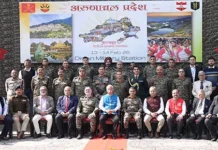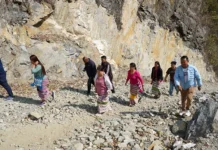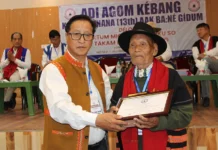[ Taba Ajum ]
With the simultaneous parliamentary and assembly elections just a day away, the Indian National Congress, which is still clawing its way back into public consciousness after most of its leaders left the party to form the BJP government in the state in 2016, finds itself on somewhat shaky ground in Arunachal Pradesh.
The party recently released its manifesto, promising, inter alia, a minimum income scheme for the poor through its unique Nyuntam Aay Yojana (NYAY). However, the more immediate issue in the Northeast region is the controversial citizenship amendment bill (CAB), which is hanging fire in the BJP’s election manifesto.
In an exclusive interview with this daily, All India Congress Committee president Rahul Gandhi spoke about these two issues, and others, via email. This is the first time that the national president of any political party has given an interview to a state daily in Arunachal.
The Arunachal Times: Can you specify how the Congress plans to deal with the CAB, and also how the Congress is going to take up the issue of underdevelopment of Arunachal Pradesh? What plans do you have for the state?
Rahul Gandhi: Like we said in our manifesto, we are committed to giving special category status to Arunachal Pradesh and the other northeastern states. Unlike the BJP, we recognize that the Northeast states face some unique problems when it comes to transportation and connectivity. The people of Arunachal need better roads, hospitals and airports, and we are committed to ensuring that they get access to these facilities and infrastructure.
As for the citizenship amendment bill, we view it as an attack on the culture of the Northeast and will not let it pass.
AT: What is the national narrative in the country right now? What are the issues this election will be fought on?
RG: If you scratch under the surface of the hyper-nationalistic narrative being spun by Prime Minister Narendra Modi and the BJP, you will find that across India, people are frustrated and angry with the present government.
There are many reasons for this. It starts with the big promises Mr Modi made to win the elections in 2014. What stands out amongst many, many false promises are: Rs 15 lakhs in each bank account; the creation of 2 crore jobs a year; and the doubling of farmer incomes. These key promises remain unfulfilled, while the government manipulates data and spends thousands of crores in advertising to convince India that all is well and that every Indian should be happy. This, while the youths are struggling with unemployment; farmers are committing suicide in the thousands; the rural economy has been devastated; atrocities are being committed against women, Dalits and Adivasis; and the very idea of India as a pluralistic, secular and democratic nation is being threatened.
AT: You have consistently maintained that one of the key issues this election will be fought on is unemployment. However, the government claims otherwise. What is the ground situation?
RG: After interacting with lakhs of young people across the country, their problems have become very clear to me. The NDA government promised to create 2 crore jobs a year, and regardless of what they may claim, unemployment in this country is at a 45-year high. Our job creation rate is dismal, a mere 450 jobs a day, compared to 50,000 in China.
There are lakhs of young people who are eager to enter the job market and make their mark, but there are zero opportunities available to them. This is causing frustration and anger among them, and more importantly, India is losing its chance at harnessing their potential.
The PM, on the other hand, lives in denial. If he refuses to even accept that there is a problem, how can he get down to solving it? Our governments in Punjab, Chhattisgarh, Rajasthan and MP are leading the way to show how jobs can be created at a massive scale. MP has already implemented a 100-day job guarantee scheme. The other states are also addressing the issue of unemployment on an emergency footing. In Punjab, the state government-organized job fairs are connecting youths with thousands of job opportunities at a very large scale.
Creating jobs is one of our top priorities, and we have laid out the roadmap in our manifesto. There are 22 lakh vacancies in government jobs, which we hope to fill by 2020. We will also create 10 lakh jobs at the gram sabha level. Also, we are empowering entrepreneurs by making the process of setting up new businesses easier by cutting through the red tape.
AT: Tell us about your NYAY scheme. How will it be rolled out?
RG: We have been working with leading economists and experts on NYAY for some time now. It is a path-breaking scheme, under which 20% of the poorest families in India, which is about 5 crore families, will receive 72,000 rupees per year. NYAY is the Congress party’s final assault on poverty.
You will recall that the PM gave a speech a few years back about MGNREGA and called it the “living monument of UPA’s failure.” Problem is, the PM doesn’t understand the basics of economics. MGNREGA was responsible for firing up the rural economy and was a huge part of the economic success and economic growth that took place in the UPA years.
It’s actually pretty simple; you put money in people’s pockets, and people use that money to buy things. When people buy things, those things need to be produced, and a powerful economic cycle starts up.
What the PM has done over the past five years is, he has completely removed all money from the economy with failed policies like demonetization and the poorly executed Gabbar Singh Tax (referring to the GST).
Particularly badly hit are the informal sectors. The aim of the NYAY scheme is twofold: first, it is to guarantee a minimum income to our people as I’ve already stated. The second is to re-monetize the economy.
Fiscally, it’s doable. We’ve checked it, rechecked it, we’ve spoken to some of the best economic minds. This has been a work in progress for many months now. NYAY will not only be a surgical strike on poverty, it will also help fire up the economy.
AT: Have you set a deadline for implementing the scheme once the Congress government is in power, and what is the target year to make India poverty-free?
RG: We’re not going to do it the way GST was done. We’re first going to run extensive pilot projects to smooth out any kinks in the implementation before we role it out nationwide. We’re also going to set down a robust way of identifying the beneficiaries.
After we’ve tested these systems and approaches, we will do a phased roll-out. As said in our manifesto, we are hoping to eliminate abject poverty in India through NYAY by 2030.
In the 10 years of the UPA government, we took 14 crore people out of poverty. Now we want to finish the job. Even today, there are 25 crore people living in poverty, many of whom, by the way, Mr Narendra Modi has put into poverty with demonetization and the Gabbar Singh Tax. Now we’re going to eliminate poverty from India.
AT: What do you propose to do for India’s health and education infrastructure?
RG: We believe that every single Indian, regardless of where they live, their caste, religion and socioeconomic group, should have access to top-notch education, and good quality healthcare.
This belief is reflected in our manifesto, where we propose to increase spending on health to 3% of the GDP, and on education to 6% of the GDP. I don’t know if you know this, but the present government has actually cut down their spending on these sectors.
We will also ensure that school education from Class 1-12 in public schools will be free and compulsory. Similarly, for healthcare, we will guarantee to every citizen the right to free healthcare services. Unlike the BJP government, which is very focused on privatizing the health and education sectors, we believe that the government should lead the way and set a high standard when it comes to schools, colleges and hospitals, which the private sector can then match.
AT: Is this election the most important battle in post-Independence India?
RG: This election is not a fight for power, but for the soul of India. Apart from the pathetic state of the economy, the agrarian distress and the massive job crisis we are facing, our most important values – secularism, diversity and pluralism – are under attack. There is a systemic assault on our constitutional institutions like the Supreme Court, the RBI and the CBI.
Officers who don’t toe the RSS line or are honest are sacked – like the CBI chief was ?at 1.00 am? in the morning. Reinstated by the Supreme Court, he was once again sacked by the PM! We’ve seen the dramatic press conference held by four judges – a first ever – drawing the attention of the Indian public to how court processes and judgments were being manipulated.
Even reputed institutions that collect data and measure the performance of various government schemes are being suppressed and dismantled. The contents of textbooks our children read are being rewritten to impose the RSS’ view of India on them.
These are only a few examples of the dangerous path the RSS/BJP is taking us down that will result in anarchy and chaos if they are voted back to power again.




